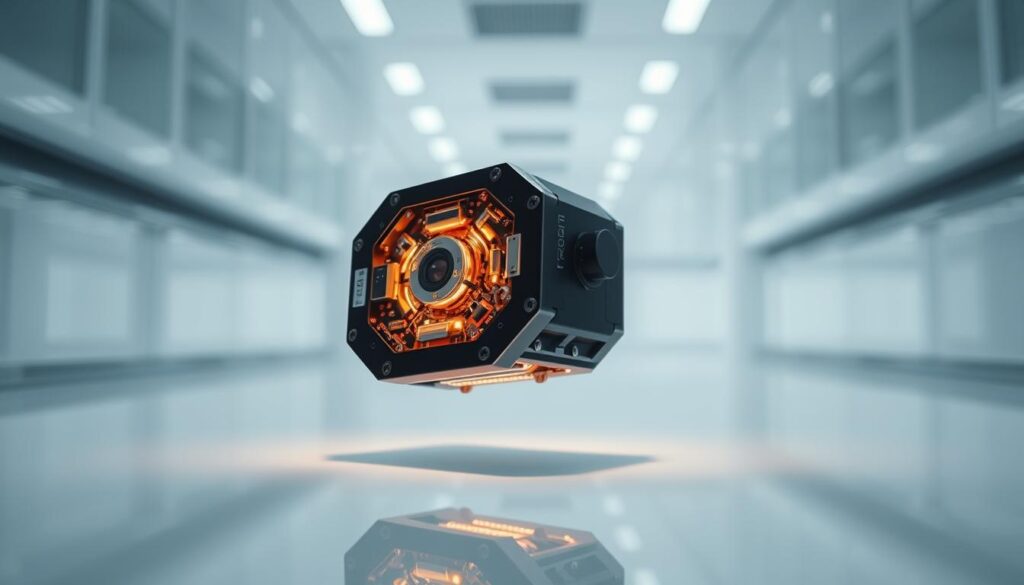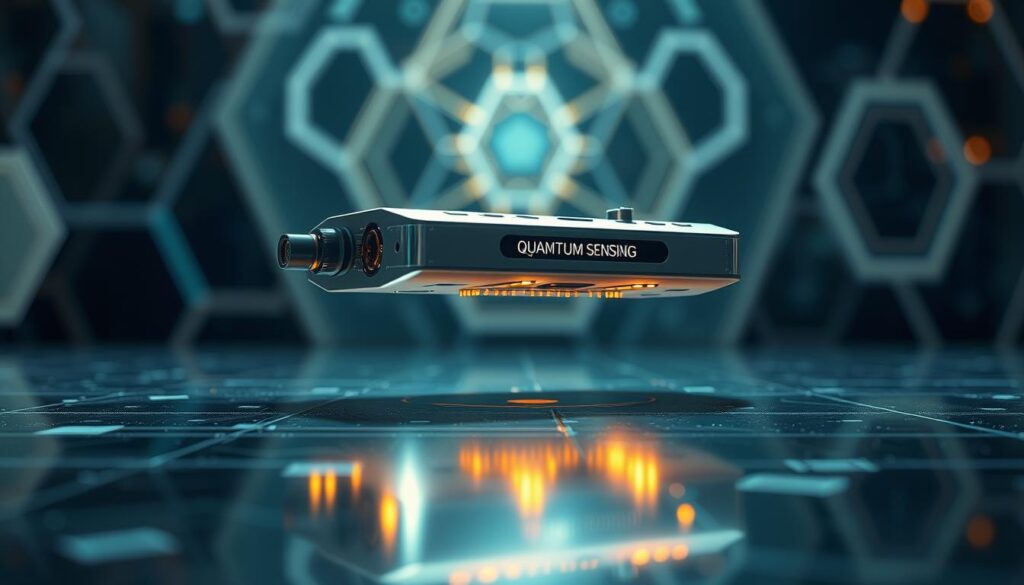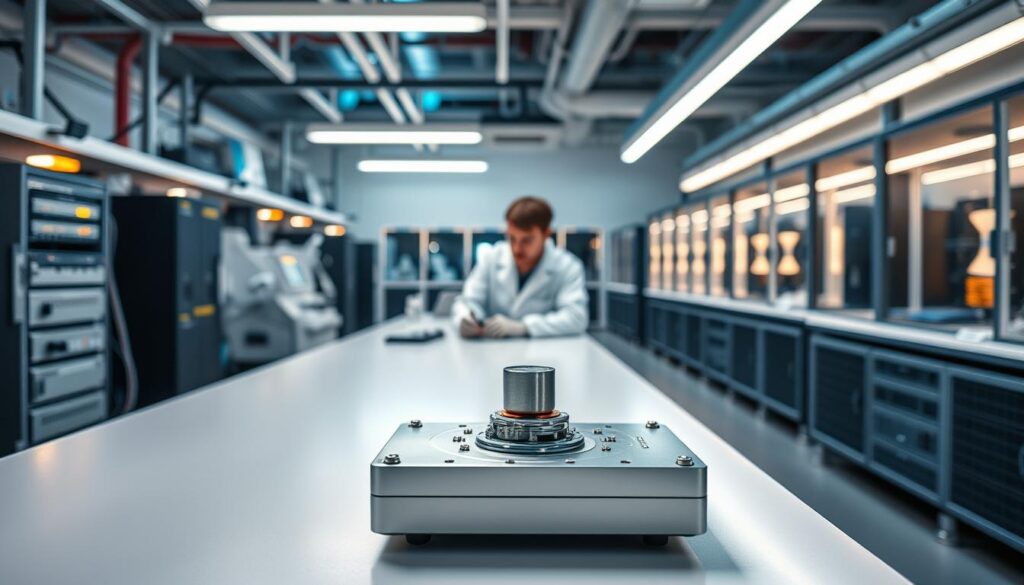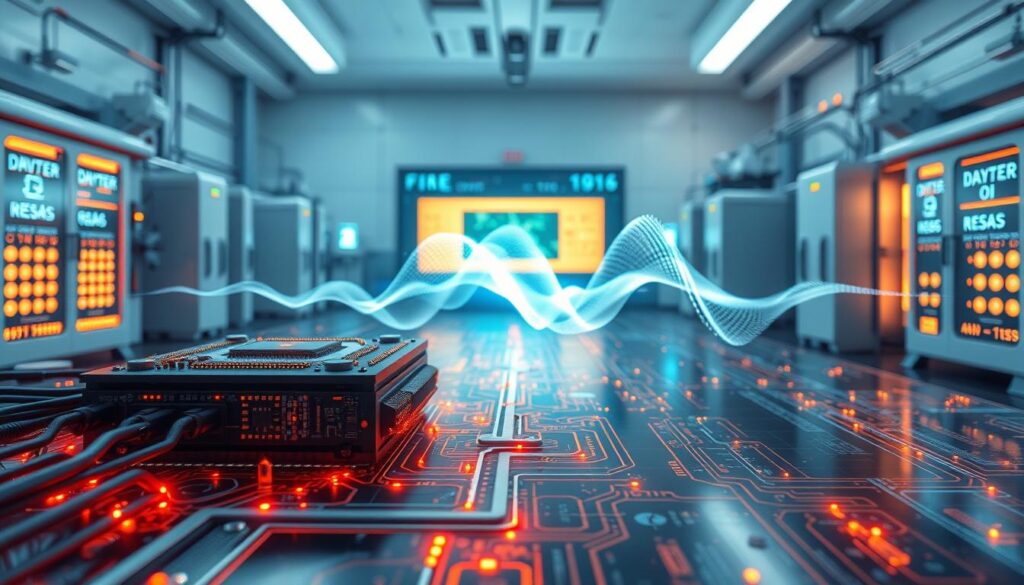Today, we need tools that are not just good, but precise and accurate. Enter quantum sensors, leading the way in high-tech measurements. They use the mysterious power of quantum mechanics. This gives them an edge over traditional sensors, unlocking new depths in how we measure things once thought impossible.
Our quest for the best in various areas, like health diagnostics and navigating vast spaces, has brought us to quantum sensors. These advanced devices have changed how we see and understand our world. They push the boundaries of what science and technology can achieve.
By improving and applying quantum sensors in different industries, we’re not just making strides in research. We’re also making life better by achieving accuracy like never before. Let’s start this journey together. We’ll discover and use these incredible sensors to set new standards in measurement.
- Key Takeaways
- The Quantum Revolution: Principles and Potential
- Quantum sensors
- Advancements in Quantum Sensing Devices
- Quantum Sensing in Scientific Research and Beyond
- The Fusion of Quantum Computing and Quantum Sensing
- Overcoming Challenges in Quantum Sensor Deployment
- Conclusion
- FAQ
- What are the core principles driving quantum sensing?
- How are quantum technologies transformative across industries?
- Can you give examples of quantum sensing applications in different sectors?
- What advancements in quantum sensing technology are particularly exciting?
- How does nanotechnology enhance the performance of quantum sensors?
- What is the significance of quantum sensors in space exploration?
- How do quantum computing and sensing technologies work together?
- What are some challenges facing the deployment of quantum sensors?
- What efforts are being made to overcome the challenges in quantum sensor deployment?
- What is the potential future impact of quantum sensing on various domains?
Key Takeaways
- Quantum sensors mark a technological leap, employing quantum mechanics for sensitivity and accuracy.
- Unmatched precision of quantum sensors paves the way for breakthroughs in healthcare and navigation.
- Advanced sensors are central to environmental monitoring, predicting climate patterns with acuity.
- Quantum sensor technology contributes significantly to enhanced diagnostic imaging in the medical field.
- The adaptation and scaling of quantum sensors promise a cascade of innovations across sectors within the next two to five years.
The Quantum Revolution: Principles and Potential
The quantum revolution is changing how we handle data and observe the world in many fields. It’s based on quantum mechanics principles, leading to new, powerful technologies.
By understanding quantum phenomena like superposition and entanglement, we can use them in exciting ways. These concepts not only change how we see physics but also lead to advanced quantum technologies.

Understanding Quantum Mechanics in Sensing
Quantum particles in superposition can be in many states at once, improving quantum sensor applications. Entanglement connects particles over long distances. This is key for quantum communication and making very precise measurements with less error.
The Transformative Power of Quantum Technologies
The quantum revolution shows us new ways to understand the universe’s basics. Quantum technologies are now real tools. They’re solving problems, from finding diseases early to making navigation systems that work without GPS.
| Quantum Phenomenon | Application | Impact |
|---|---|---|
| Superposition | Sensors for Magnetic Fields | Enhances detection capabilities beyond classical limits |
| Entanglement | Quantum Cryptography | Provides unbreakable encryption for secure communications |
| Quantum Coherence | Computational Sensors | Maintains precision and stability over extended periods |
This growing field is not just a step forward in science. It also means we need to change how we understand physics. It suggests a future where quantum and classical physics blend smoothly.
Quantum sensors
Quantum sensors are changing technology in big ways. They make everyday gadgets better and help in key industries. These tools are making us rethink how we interact with the world around us.
Revolutionary Quantum Sensing Applications Across Industries
Quantum sensors are making big changes in many areas. In energy and building sectors, they offer super precise measurements. This allows for the tracking of tiny changes that we couldn’t see before.
This ability leads to better maintenance that avoids big repair costs. In things like environmental studies, quantum sensors give super accurate data. This greatly improves weather models and how we respond to environmental changes.
Enhancing Measurement: From Navigation to Healthcare
In navigation, quantum sensors are a step up where old GPS systems can’t keep up. They stay accurate even when GPS doesn’t work. This is great for both everyday use and the military.
In healthcare, these sensors are making a huge difference. They let doctors look inside the body without surgery. This helps find diseases early, which can save lives.
Both navigation and healthcare get a lot better with these sensors. Navigation tech works in all conditions. And healthcare becomes quicker and more tailored to each person.

Using these advanced sensors helps us move forward technologically. It also improves our lives by giving us services that meet our safety and needs better.
| Industry | Quantum Sensor Application | Benefit |
|---|---|---|
| Navigation | High-resolution field detection | Operation in GPS-denied environments |
| Healthcare | Non-invasive diagnostics | Early disease detection and personalized treatment |
| Environmental Monitoring | Precise data collection | Improved forecasting and environmental protection strategies |
As we keep working with quantum sensors, the future looks bright. They’re not just changing the present; they’re opening up new chances for the future.
Advancements in Quantum Sensing Devices
Quantum sensing is racing ahead, thanks to amazing tech advances and superior sensors. We’re seeing a new era of precision in quantum sensors today. This level of detail was unthinkable ten years ago.
As this field grows, new sensor technology joins forces with quantum devices for extra precise measurements. These breakthroughs are great for science and help in healthcare, environmental care, and tech.

Pushing the Boundaries: Next-Generation Sensors
Creating new sensors with quantum tech shows how combining quantum physics and material science is powerful. Devices like NV-diamond sensors spot magnetic fields with amazing accuracy. They work at a tiny scale and give us better resolution. This opens doors for new studies in the brain and more precise diagnostics.
The Role of Nanotechnology in Quantum Sensor Development
Nanotech is key in advancing quantum sensors, especially in developing devices that work at room temperature. These sensors have tiny features that improve their sensitivity. This makes quantum devices fit into everyday tech, from phones to medical tools.
By bringing together quantum systems and nanotechnology, experts can look into new uses. This focus on making them accessible could change many parts of our lives. It paves the way for progress that once seemed like only fiction.
Quantum Sensing in Scientific Research and Beyond
Quantum sensing technologies are very important in today’s scientific research. They are becoming more popular, thanks to the need for precise tools in areas like space exploration. These technologies are changing how we measure and understand the invisible forces around us.

Unlocking Mysteries: Quantum Sensors in Space Exploration
Using quantum sensors in space exploration is starting a new chapter in discovering the universe. Sensors such as advanced gravimeters and magnetometers are key. They help collect data on distant astronomical objects’ gravitational fields and magnetic perturbations. This information is vital for our knowledge of space and what lies beyond Earth.
Read more: BioPrinting explanation very simply! 2025
Read more: 3D Printing in 2025: Innovations, Applications, and Future Insights
Read more: What exactly is multimodal AI?
Groundbreaking Discoveries with High-Precision Sensors
On Earth, quantum sensors are crucial in expanding our knowledge in physics and materials engineering. They can detect very small changes, important for discoveries at the atomic or subatomic level. Companies creating these sensors are leading the way in making them more sensitive and accurate. Thanks to these advancements, we’re seeing major leaps in technology and its uses.
The Fusion of Quantum Computing and Quantum Sensing
Mixing quantum computing with quantum sensing is changing our grasp of advanced sensing tech. This combo is making sensors more accurate and efficient. They’re now better at analyzing complex data.

Quantum information helps make quantum sensing devices work better. Thanks to quantum computing’s advanced algorithms, these sensors capture and analyze data more accurately and quickly. This widens the research field of quantum sensors.
Quantum Information Processing Enhancing Sensor Capabilities
Quantum computing is key for processing loads of quantum info really fast. This not only quickens research and development for sensors but also boosts their real-time data analysis. These advancements mark an exciting era in sensor tech.
Synergy between Quantum Computing and Sensing Technologies
The mix of computing power with advanced sensing is sparking new inventions. Using quantum computing, we’re making sensors that are quick, reliable, and very sensitive. This teamwork is crucial for creating future tech like self-driving cars and advanced remote sensing.
| Feature | Impact of Quantum Computing | Impact on Sensor Technology |
|---|---|---|
| Processing Speed | Significantly increased | Real-time data interpretation |
| Accuracy | High precision algorithms | Enhanced detection of subtle anomalies |
| Innovative Potential | Explores complex simulations | Leads to breakthroughs in sensor applications |
To sum up, quantum computing and sensing joining forces is kicking off an era of tech synergy. By using advanced sensing tech and diving into quantum sensor research, we’re pushing the limits of what’s possible. This promises new breakthroughs in many areas.
Overcoming Challenges in Quantum Sensor Deployment
In the world of quantum sensor systems, overcoming deployment challenges is key. These technologies offer unmatched accuracy. Yet, their high sensitivity to “noise” in the environment is a big issue. Finding ways to reduce this issue without affecting the sensor’s performance is a major focus.
Quantum sensors can detect very small changes around them because they are so sensitive. But this sensitivity is both good and bad. Noise from the environment can make quantum sensor systems less dependable. Researchers are using methods like dynamical decoupling and cooling at very low temperatures to solve this. These techniques help sensors work better and longer, making them more reliable for different uses. The push for better quantum sensors continues to be important.
Scalability and Cost: The Ongoing Quest for Practicality
The size and price of quantum sensors also present big hurdles. Although they are very precise, making a lot of them without spending too much is tough. Working together, schools and companies are trying to fix these problems. Investing wisely and improving how they are made will help make these sensors more common. Research on quantum sensors that work at room temperature is also exciting. It may lead to lower costs and easier ways to make them, helping the quantum sensor market grow.
Conclusion
As we look toward the future of quantum sensing, we see its potential to change many areas. This includes healthcare, navigation, and scientific research. Quantum sensors bring a new level of precision and sophistication to these fields.
In healthcare, these sensors are making MRI techniques more sensitive. This improvement helps in finding illnesses sooner and diagnosing them more accurately. For navigation, quantum sensors are making location tracking much more precise. This is very important for activities that don’t use GPS, such as flying and self-driving cars.
But, this path has its challenges. Quantum sensors are very sensitive, which means they can be affected by environmental noise. This problem needs inventive and relentless efforts to solve. Also, making them affordable and large-scale is a big challenge. Working together across academia, industry, and regulation is key. This collaboration will help make quantum sensor technology a practical choice for everyone.
We are all excited about what quantum sensors can do. Their amazing abilities promise to push forward progress in many fields. These include better environmental monitoring and more insightful climate studies. Plus, industries will see improvements in quality control thanks to these sensors. We are on the edge of a big change. Here, advanced sensor technology shapes our world in ways we once thought impossible.
Quantum sensor – click here
FAQ
What are the core principles driving quantum sensing?
The key principles are superposition, allowing particles to be in many states at once. There’s also entanglement, which ensures particles are linked no matter the distance. Lastly, quantum coherence keeps measurements accurate over time.
How are quantum technologies transformative across industries?
Quantum technologies bring huge changes by offering unbeatable precision and sensitivity. They help detect diseases early in healthcare, improve navigation without GPS, monitor the environment accurately, and boost scientific research.
Can you give examples of quantum sensing applications in different sectors?
Sure! In healthcare, quantum sensors help with accurate diagnostics and wearable health monitors. They offer new ways to navigate without GPS in the navigation sector. They’re also used for finding faults, measuring underground, and working with AI in various technologies.
What advancements in quantum sensing technology are particularly exciting?
Some thrilling advancements are NV-diamond sensors, which allow for very fine magnetic imaging. There are also quantum gravimeters and atomic clocks that use atomic transitions. These advancements improve timekeeping and navigation greatly.
How does nanotechnology enhance the performance of quantum sensors?
Nanotechnology leads to smaller quantum sensors. It also incorporates quantum features into tiny structures. This improves how well they work in mapping magnetic fields and diagnosing medical conditions.
What is the significance of quantum sensors in space exploration?
Quantum sensors are crucial for exploring space, like studying distant planets. They help understand space better by making very detailed measurements in those harsh conditions.
How do quantum computing and sensing technologies work together?
Quantum computing enhances how quantum sensors process data, thanks to quantum algorithms. This partnership allows for more complex measurements and more effective quantum sensor systems.
What are some challenges facing the deployment of quantum sensors?
Main challenges include their sensitivity to environmental disruptions, which affects accuracy. Also, high costs and complex technology make it hard to use them widely.
What efforts are being made to overcome the challenges in quantum sensor deployment?
Solutions being worked on include cooperation between universities and companies, significant investments, improvements in making these sensors, and creating room-temperature sensors. These efforts aim to make quantum sensors cheaper, more practical, and scalable.
What is the potential future impact of quantum sensing on various domains?
Quantum sensing could transform healthcare, navigation, and research with its unmatched capabilities. Overcoming current barriers with ongoing innovation and investments will unlock its full promise.
Get in Touch with SJ Articles
Read more: Quick Skill Wins: Top Microlearning Apps for 2025
Read more: Easy AI Tools for Social Media Planning
Read more: Automated Machine Learning Guide 2025


